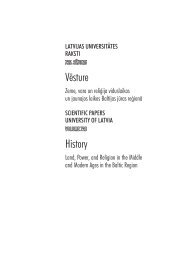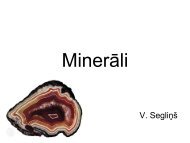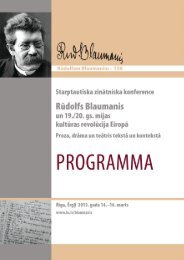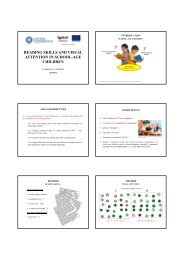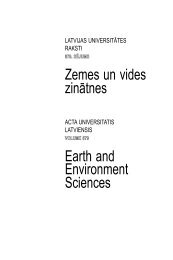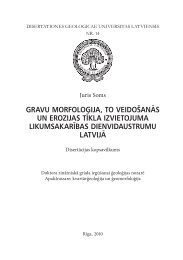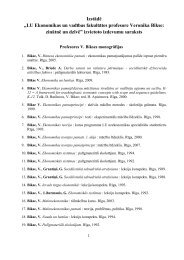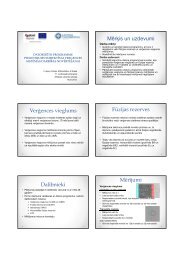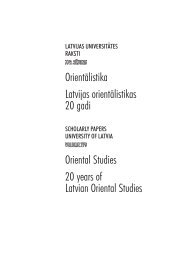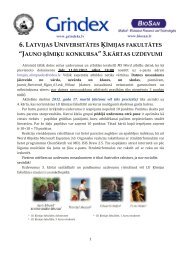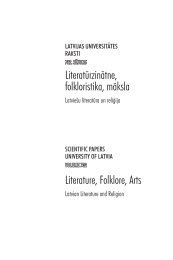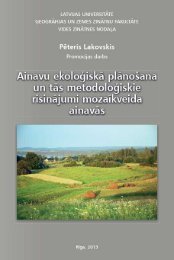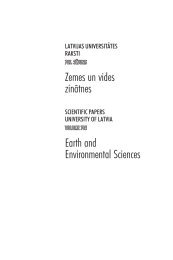Latgalistikys kongresu materiali, III. 2011. - Latvijas Universitāte
Latgalistikys kongresu materiali, III. 2011. - Latvijas Universitāte
Latgalistikys kongresu materiali, III. 2011. - Latvijas Universitāte
Create successful ePaper yourself
Turn your PDF publications into a flip-book with our unique Google optimized e-Paper software.
the answers to the survey, providing also information on the difference<br />
between the perceived and real linguistic landscape. The questionnaire was<br />
then left with the respondent for a couple of days, even if quite often it<br />
proved necessary for the research assistants to assist the respondents in<br />
completing the questionnaire, especially in the case of elderly people.<br />
The questions (about 100) investigated the respondents’ perceptions<br />
of the linguistic panorama of the area. As may be expected in this kind of<br />
ifield research, ideological statements are more readily obtainable than<br />
objective description. On the one hand, the researcher cannot verify the<br />
reliability of the answers, on the other the respondent may not be able (nor<br />
even willing) to describe their linguistic behaviour in an objective manner.<br />
What we ultimately obtain is a declaration of ‘opportunity of use’, a good<br />
measure of the status and subjective vitality of the languages in the area<br />
surveyed, which allows us to make some forecasts about the future evolution<br />
of the codes. Nevertheless, the wide range of questions and the highly<br />
representative sample can actually provide quite a realistic overview of the<br />
current linguistic situation, both from a social and a geographical point of<br />
view 27 .<br />
2. For the purposes of this study, the answers to three questions have<br />
been analysed, namely the language(s) spoken with one’s partner, with<br />
small children and with older relatives. The questions, translated into English,<br />
read:<br />
— What languages and/or dialects do you speak with small children? 28<br />
— What languages and/or dialects do you speak with your partner/husband-wife?<br />
29<br />
— What languages and/or dialects do you speak with elderly relatives? 30<br />
27 The methodology of the surveys is discussed in detail in the literature cited in Note 1.<br />
28 Actual questions: (Latvian, Russian, Latgalian): Kurā valodā vai dialektā Jūs runājat<br />
ar Jūsu apkaimes bērniem? / На каком языке и(ли) диалекте Вы говорите с<br />
детьми вашей местности? / Kurā volūdā voi dialektā Jius runojat ar Jiusu apleicīnis<br />
bārnim?<br />
29 Actual questions: (Latvian, Russian, Latgalian): Kurā valodā vai dialektā Jūs runājat<br />
ar dzīvesbiedru/-eni vai draugu/draudzeni? / На каком языке и(ли) диалекте<br />
Вы говорите с супругом (супругой) или другом (подругой)? / Kurā volūdā voi<br />
dialektā Jius runojat ar lauluotū ci draugu/draudzini?<br />
30 Actual questions: (Latvian, Russian, Latgalian): Kurā valodā vai dialektā Jūs runājat<br />
ar vecākiem radiniekiem? / На каком языке и(ли) диалекте Вы говорите с<br />
родственниками старшего поколения? / Kurā volūdā voi dialektā Jius runojat ar<br />
vacuokim radinīkim?<br />
94



